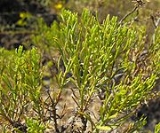
Ericameria laricifolia
Encyclopedia
Ericameria laricifolia is a species of flowering shrub in the daisy family
known by the common name turpentine bush, or turpentine-brush. This plant is native to the southwestern United States and northern Mexico, where it grows in desert scrub and woodland. This shrub
reaches one half to one meter in height, is generally hairless, somewhat glandular, and aromatic. It sometimes has naked stems at the base but the upper branches are densely foliated in needlelike, pointed leaves one to three centimeters long. The many erect branches bear inflorescence
s of bright golden yellow flower heads
, each with many long disc florets and a few ray florets.
Asteraceae
The Asteraceae or Compositae , is an exceedingly large and widespread family of vascular plants. The group has more than 22,750 currently accepted species, spread across 1620 genera and 12 subfamilies...
known by the common name turpentine bush, or turpentine-brush. This plant is native to the southwestern United States and northern Mexico, where it grows in desert scrub and woodland. This shrub
Shrub
A shrub or bush is distinguished from a tree by its multiple stems and shorter height, usually under 5–6 m tall. A large number of plants may become either shrubs or trees, depending on the growing conditions they experience...
reaches one half to one meter in height, is generally hairless, somewhat glandular, and aromatic. It sometimes has naked stems at the base but the upper branches are densely foliated in needlelike, pointed leaves one to three centimeters long. The many erect branches bear inflorescence
Inflorescence
An inflorescence is a group or cluster of flowers arranged on a stem that is composed of a main branch or a complicated arrangement of branches. Strictly, it is the part of the shoot of seed plants where flowers are formed and which is accordingly modified...
s of bright golden yellow flower heads
Head (botany)
The capitulum is considered the most derived form of inflorescence. Flower heads found outside Asteraceae show lesser degrees of specialization....
, each with many long disc florets and a few ray florets.

